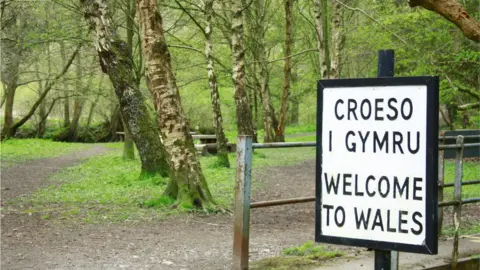Tree planting: National Trust plan prompts farm fears
 Getty Images
Getty Images Plans to plant more than 20 million trees could be damaging for Welsh farmers, a union has warned.
The National Trust wants to create 18,000 hectares (44,478 acres) of new woodland across Wales, England and Northern Ireland by 2030.
President of the Farmers' Union of Wales Glyn Roberts said he feared grazing areas could be lost in order to meet the target.
The National Trust said it would work with farmers on the project.
The organisation wants to increase the proportion of its land covered by trees from 10% to 17% in a bid to reach a "carbon net zero" target.
It is thought between 1,000-2,000 hectares (2,471 - 4,942 acres) of new woodland will be planted in Wales as part of the scheme.
But Mr Roberts, a National Trust tenant farmer near Betws y Coed, Conwy county, said he feared forestry in rural areas could have a negative impact on farmers, food production and communities, if grassland is lost.
"If you look at Penmachno, just a few miles from here, tree planting has caused depopulation and had a negative impact on the Welsh language and culture," he said.
"I feel agriculture has been attacked from all sides during the past six months. This is another blow that we don't need."
Mr Roberts said grassland could be effective in tackling global warming and the farming industry had worked to mitigate the impact.
The National Trust said the extra woodland would help lock up to 300,000 tonnes of carbon - equivalent to the energy output of 37,000 homes a year.
Trystan Edwards, from the conservation charity, said it would work in partnership with tenants on the forestry project.
"We've been doing this work for a long time, so it's a continuation," he said.
"Its not about taking good farmland out of agricultural productivity. I feel our tenants will have a good relationship with the trust and they'll know how to approach these matters."
